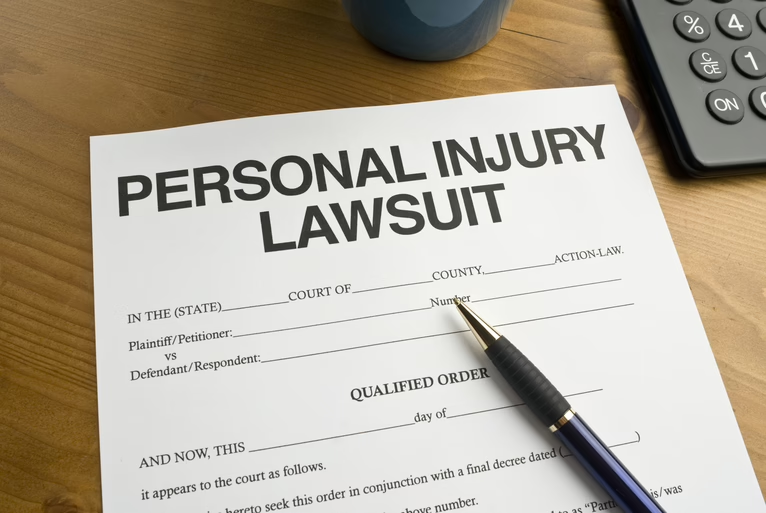Defendant

A defendant is the person or party in a lawsuit being sued. In a personal injury case, it is the individual being accused of causing injuries and harm to the plaintiff (the injured party).
Your personal injury claim might be settled through negotiations with the at-fault party’s insurance company. However, you will likely file a personal injury lawsuit if you cannot reach a fair settlement. You may even need to go to trial to protect your rights. If so, you want an experienced personal injury attorney on your side to fight for full compensation for your damages.
Table of Contents
- Who Are Defendants in Personal Injury Cases in Texas?
- What Do I Need to Prove to Win a Personal Injury Lawsuit in Texas?
- Does the Defendant in a Texas Personal Injury Case Need to Prove Anything?
- Need Help? Click Here or Call 1-888-603-3636 to Schedule a Free Consultation With an Undefeated Houston Personal Injury Lawyer
Who Are Defendants in Personal Injury Cases in Texas?

A defendant is a party who contributed to the cause of a victim’s injuries. The defendant can be a person, corporation, government agency, or legal entity. The plaintiff seeks compensation for economic and non-economic damages by alleging that the defendant caused or contributed to the cause of their injuries.
Many situations can give rise to a personal injury claim.
Examples of accidents and circumstances that could lead to a personal injury lawsuit in Texas include, but are not limited to:
- Car accidents
- Oilfield accidents
- Wrongful death
- Medical malpractice
- Construction accidents
- Oil rig accidents
- Plant and refinery accidents
- Dog bites and animal attacks
- Motorcycle accidents
- Slip and fall accidents (premises liability)
- Nursing home abuse and neglect
- Defective products (product liability)
- Workplace accidents
- Pedestrian and bicycle accidents
- Truck accidents
The liability insurance company may handle the injury claim for the at-fault party. However, you don’t typically sue the insurance company if it refuses to settle the claim for an amount you believe is fair. Instead, the lawsuit names the at-fault party as the defendant.
Even if you don’t sue the insurer, the company will likely be involved in a personal injury lawsuit. An insurance company generally hires a defense attorney to respond to the lawsuit. The defendant has the right to hire an attorney of their choosing to represent them, but they must pay the attorney’s fees.
What Do I Need to Prove to Win a Personal Injury Lawsuit in Texas?
Many personal injury lawsuits filed in Texas are negligence-based claims. These claims allege that the defendant failed to meet a standard of care or use reasonable care to avoid hurting the plaintiff. The plaintiff has the burden of proving their case.
The required legal elements of a negligence-based personal injury claim are:
- Duty of care – The party being sued had a legal duty of care to avoid causing injury to the plaintiff.
- Breach of duty – The party’s conduct breached their legal duty of care. The conduct may be in the form of actions or inaction.
- Causation – The at-fault party’s conduct was the proximate and direct cause of the plaintiff’s injuries.
- Damages – The defendant is responsible for causing the plaintiff to incur damages.
There may be another basis for a personal injury lawsuit. Other causes of action could include strict liability, intentional torts, vicarious liability, and product liability. Our Houston personal injury lawyers will diligently investigate the cause of your injuries, gather evidence, and determine which causes of action are supported by the evidence.
Does the Defendant in a Texas Personal Injury Case Need to Prove Anything?
Generally, the defendant does not have a burden of proof in a personal injury case. However, if they raise an affirmative defense, they must prove the elements of that defense to convince a jury not to hold them liable for damages.
Potential defenses a defendant may allege in a personal injury case include:
Comparative Negligence
Texas has a modified comparative fault law for personal injury cases. If the defendant proves you were more than 50% to blame for the cause of your injuries, you are barred from receiving compensation for your losses. If the jury believes you are less than 51% at fault, the judge will reduce your compensation by your percentage of fault.
Expiration of the Statute of Limitations
The Texas statute of limitations sets a two-year deadline for filing most personal injury cases. If you file a lawsuit after two years, the judge can dismiss it upon a defendant’s motion to dismiss. There are some exceptions, so it is always best to seek legal advice as soon as possible after an accident.
Failure to Mitigate Damages
Injured parties have a duty to mitigate damages through reasonable steps. Mitigating damages means trying not to make your injuries or damages worse. For example, you seek prompt medical care after an injury and follow your doctor’s treatment plan.
If a jury believes you failed to mitigate your damages, you may not receive the full value of your losses.
Need Help? Click Here or Call 1-888-603-3636 to Schedule a Free Consultation With an Undefeated Houston Personal Injury Lawyer
You don’t have to face this fight alone. Call Zehl & Associates now for a free case review with an undefeated Houston personal injury attorney.
FREE CASE REVIEW
Fill Out the Form Below for a Free Case Review with our Undefeated Personal Injury Lawyers
All communications are private and confidential. This site is protected by reCAPTCHA and the Google Privacy Policy and Terms of Service apply.